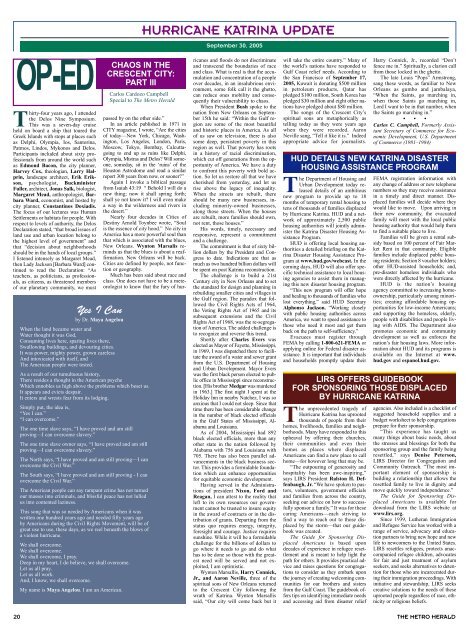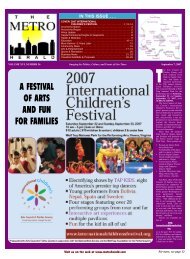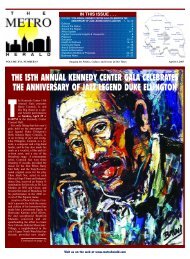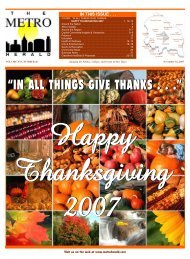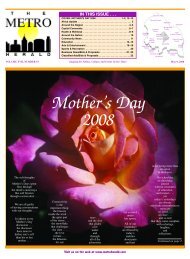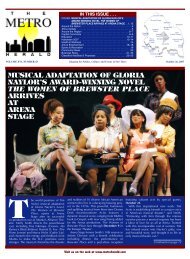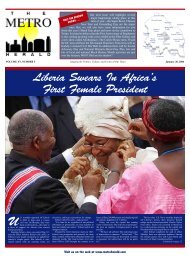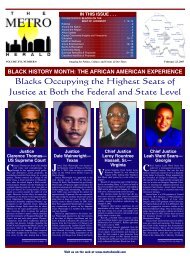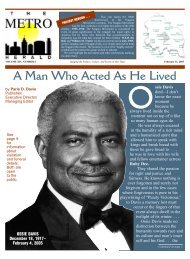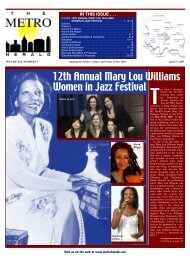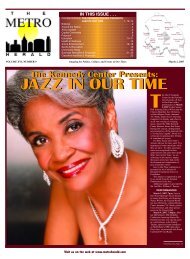Create successful ePaper yourself
Turn your PDF publications into a flip-book with our unique Google optimized e-Paper software.
OP-ED<br />
Carlos<br />
Thirty-four years ago, I attended<br />
the Delos Nine Symposium.<br />
This was a seven-day cruise<br />
held on board a ship that toured the<br />
Greek Islands with stops at places such<br />
as Delphi, Olympia, Ios, Santorina,<br />
Patmos, Lindos, Mykonos and Delos.<br />
Participants included about sixty professionals<br />
from around the world such<br />
as Edmond Bacon, the city planner,<br />
Harvey Cox, theologian, Larry Halprin,<br />
landscape architect, Erik Erikson,<br />
psychologist, Buckminister<br />
Fuller, architect, Jonas Salk, biologist,<br />
Margaret Mead, anthropologist, Barbara<br />
Ward, economist, and hosted by<br />
city planner, Constantinos Doxiadis.<br />
<strong>The</strong> focus of our lectures was Human<br />
Settlements or habitats for people. With<br />
respect to levels of authority, the Delos<br />
Declaration stated, “that broad issues of<br />
land use and urban location belong to<br />
the highest level of government” and<br />
that “decision about neighborhoods<br />
should be in the hands of local groups.”<br />
I listened intensely as Margaret Mead,<br />
then Lady Jackson [Barbara Ward] continued<br />
to read the Declaration: “As<br />
teachers, as politicians, as professionals,<br />
as citizens, as threatened members<br />
of our planetary community, we must<br />
Yes I Can<br />
by Dr. Maya Angelou<br />
take up the work of building a decent<br />
order CHAOS of human settlements, IN THEanything<br />
less than a serious and generous response<br />
lays us open to the ultimate<br />
CRESCENT CITY:<br />
judgment-that we came and saw and<br />
PART III<br />
HURRICANE KATRINA UPDATE<br />
Cardozo Campbell<br />
Special to <strong>The</strong> <strong>Metro</strong> <strong>Herald</strong><br />
When the land became water and<br />
Water thought it was God,<br />
Consuming lives here, sparing lives there,<br />
Swallowing buildings, and devouring cities.<br />
It was power, mighty power, grown careless<br />
And intoxicated with itself, and<br />
<strong>The</strong> American people were tested.<br />
As a result of our tumultuous history,<br />
<strong>The</strong>re resides a thought in the American psyche<br />
Which ennobles us high above the problems which beset us.<br />
It appears and evicts despair.<br />
It enters and wrests fear from its lodging.<br />
Simply put, the idea is,<br />
“Yes I can.”<br />
“I can overcome.”<br />
<strong>The</strong> one time slave says, “I have proved and am still<br />
proving—I can overcome slavery.”<br />
<strong>The</strong> one time slave owner says, “I have proved and am still<br />
proving—I can overcome slavery.”<br />
<strong>The</strong> North says, “I have proved and am still proving—I can<br />
overcome the Civil War.”<br />
<strong>The</strong> South says, “I have proved and am still proving - I can<br />
overcome the Civil War.”<br />
<strong>The</strong> American people can say rampant crime has not turned<br />
our masses into criminals, and blissful peace has not lulled<br />
us into contented laziness.<br />
This song that was so needed by Americans when it was<br />
written one hundred years ago and needed fifty years ago<br />
by Americans during the Civil Rights Movement, will be of<br />
great use to use, these days, as we reel beneath the blows of<br />
a violent hurricane.<br />
We shall overcome.<br />
We shall overcome.<br />
We shall overcome, I pray.<br />
Deep in my heart, I do believe, we shall overcome.<br />
Let us all pray.<br />
Let us all work.<br />
And, I know, we shall overcome.<br />
My name is Maya Angelou. I am an American.<br />
September 30, 2005<br />
passed by on the other side.”<br />
In an article published in 1971 in<br />
CITY magazine, I wrote, “Are the cities<br />
of today—New York, Chicago, Washington,<br />
Los Angeles, London, Paris,<br />
Moscow, Tokyo, Bombay, Calcuttagoing<br />
to end up as ruins like Delphi,<br />
Olympia, Mistras and Delos Will someone,<br />
someday, sit in the ‘ruins’ of the<br />
Houston Astrodome and read a similar<br />
report 300 years from now, or sooner”<br />
Again I invoke a biblical passage<br />
from Isaiah 43:19 “ Behold I will do a<br />
new thing; now it shall spring forth;<br />
shall ye not know it I will even make<br />
a way in the wilderness and rivers in<br />
the desert.”<br />
Nearly four decades in Cities of<br />
Destiny Arnold Toynbee wrote, “Soul<br />
is the essence of city hood.” No city in<br />
America has a more powerful soul than<br />
that which is associated with the blues,<br />
New Orleans. Wynton Marsalis reminds<br />
us that the blues is about a reaffirmation.<br />
New Orleans will be back.<br />
Cities are defined by people, not function<br />
or geography.<br />
Much has been said about race and<br />
class. One does not have to be a meteorologist<br />
to know that the fury of hurricanes<br />
and floods do not discriminate<br />
and transcend the boundaries of race<br />
and class. What is real is that the accumulation<br />
and concentration of a people<br />
over decades, in an insalubrious environment,<br />
some folk call it the ghetto,<br />
can reduce ones mobility and consequently<br />
their vulnerability to chaos.<br />
When President Bush spoke to the<br />
nation from New Orleans on September<br />
15th he said: “Within the Gulf region<br />
are some of the most beautiful<br />
and historic places in America. As all<br />
of us saw on television, there is also<br />
some deep, persistent poverty in this<br />
region as well. That poverty has roots<br />
in a history of racial discrimination,<br />
which cut off generations from the opportunity<br />
of America. We have a duty<br />
to confront this poverty with bold action.<br />
So let us restore all that we have<br />
cherished from yesterday, and let us<br />
rise above the legacy of inequality.<br />
When the streets are rebuilt, there<br />
should be many new businesses, including<br />
minority-owned businesses,<br />
along those streets. When the houses<br />
are rebuilt, more families should own,<br />
not rent, those houses.”<br />
His words, timely, necessary and<br />
responsive, represent a commitment<br />
and a challenge.<br />
<strong>The</strong> commitment is that of sixty billion<br />
dollars by the President and Congress<br />
to date. Indications are that as<br />
much as two hundred billion dollars will<br />
be spent on post Katrina reconstruction.<br />
<strong>The</strong> challenge is to build a 21st<br />
Century city in New Orleans and to set<br />
the standard for design and planning in<br />
rebuilding smaller cities and villages in<br />
the Gulf region. <strong>The</strong> paradox that followed<br />
the Civil Rights Acts of 1964,<br />
the Voting Rights Act of 1965 and its<br />
subsequent extensions and the Civil<br />
Rights Act of 1968, was the re-segregation<br />
of America. <strong>The</strong> added challenge is<br />
to recognize and reverse this trend.<br />
Shortly after Charles Evers was<br />
elected as Mayor of Fayette, Mississippi,<br />
in 1969, I was dispatched there to facilitate<br />
the award of a water and sewer grant<br />
from the U.S. Department of Housing<br />
and Urban Development. Mayor Evers<br />
was the first black person elected to public<br />
office in Mississippi since reconstruction.<br />
[His brother Medgar was murdered<br />
in 1963.] <strong>The</strong> first night I spent at the<br />
Holiday Inn in nearby Natchez, I was so<br />
anxious that I could not sleep. Since that<br />
time there has been considerable change<br />
in the number of black elected officials<br />
in the Gulf States of Mississippi, Alabama<br />
and Louisiana.<br />
As of 2004, Mississippi had 892<br />
black elected officials, more than any<br />
other state in the nation followed by<br />
Alabama with 756 and Louisiana with<br />
705. <strong>The</strong>re has also been parallel advancements<br />
in the black business sector.<br />
This provides a formidable foundation<br />
which can enhance opportunities<br />
for equitable economic development.<br />
Having served in the Administrations<br />
of president Nixon, Ford and<br />
Reagan, I can attest to the reality that<br />
left to its own resources our government<br />
cannot be trusted to insure equity<br />
in the award of contracts or in the distribution<br />
of grants. Departing from the<br />
status quo requires energy, integrity,<br />
foresight and courage. Justice requires<br />
sunshine. While it will be a formidable<br />
challenge for the billions of dollars to<br />
go where it needs to go and do what<br />
has to be done so those with the greatest<br />
need will be served and not exploited,<br />
I am optimistic.<br />
Wynton Marsallis, Harry Connick,<br />
Jr., and Aaron Neville, three of the<br />
spiritual sons of New Orleans returned<br />
to the Crescent City following the<br />
wrath of Katrina. Wynton Marsallis<br />
said, “Our city will come back but it<br />
will take the entire country.” Many of<br />
the world’s nations have responded to<br />
Gulf Coast relief needs. According to<br />
the San Francisco of September 17,<br />
2005, Kuwait is donating $500 million<br />
in petroleum products, Qatar has<br />
pledged $100 million, South Korea has<br />
pledged $30 million and eight other nations<br />
have pledged about $80 million.<br />
<strong>The</strong> songs of the Crescent City’s<br />
spiritual sons are metaphorically as<br />
telling today as they were years ago<br />
when they were recorded. Aaron<br />
Neville sang, “Tell it like it is.” Indeed<br />
appropriate advice for journalists.<br />
<strong>The</strong> Department of Housing and<br />
Urban Development today released<br />
details of an ambitious<br />
new program to provide up to 18<br />
months of temporary rental housing to<br />
tens of thousands of families displaced<br />
by Hurricane Katrina. HUD and a network<br />
of approximately 2,500 public<br />
housing authorities will jointly administer<br />
the Katrina Disaster Housing Assistance<br />
Program.<br />
HUD is offering local housing authorities<br />
a detailed briefing on the Katrina<br />
Disaster Housing Assistance Program<br />
at www.hud.gov/webcast. In the<br />
coming days, HUD will also offer specific<br />
technical assistance to local housing<br />
agencies to assist them in managing<br />
this new disaster housing program.<br />
“This new program will offer hope<br />
and healing to thousands of families who<br />
lost everything,” said HUD Secretary<br />
Alphonso Jackson. “Working closely<br />
with public housing authorities across<br />
America, we want to speed assistance to<br />
those who need it most and get them<br />
back on the path to self-sufficiency.”<br />
Evacuees must register through<br />
FEMA by calling 1-800-621-FEMA or<br />
applying online for Federal disaster assistance.<br />
It is important that individuals<br />
and households promptly update their<br />
Harry Connick, Jr., recorded “Don’t<br />
fence me in.” Spiritually, a clarion call<br />
from those locked in the ghetto.<br />
<strong>The</strong> late Louis “Pops” Armstrong,<br />
sang these words, as familiar to New<br />
Orleans as gumbo and jambalaya,<br />
“When the Saints, go marching in,<br />
when those Saints go marching in,<br />
Lord I want to be in that number, when<br />
the Saints go marching in.”<br />
• • •<br />
Carlos C. Campbell, Formerly Assistant<br />
Secretary of Commerce for Economic<br />
Development, U.S. Department<br />
of Commerce (1981–1984)<br />
HUD DETAILS NEW KATRINA DISASTER<br />
HOUSING ASSISTANCE PROGRAM<br />
<strong>The</strong> unprecedented tragedy of<br />
Hurricane Katrina has uprooted<br />
thousands of people from their<br />
homes, livelihoods, families and neighborhoods.<br />
Many have responded to this<br />
upheaval by offering their churches,<br />
their communities and even their<br />
homes as places where displaced<br />
Americans can find a new place to call<br />
home—for however long that may be.<br />
“<strong>The</strong> outpouring of generosity and<br />
hospitality has been awe-inspiring,”<br />
says LIRS President Ralston H. Deffenbaugh,<br />
Jr. “We have spoken to pastors,<br />
volunteers, government officials<br />
and families from across the country,<br />
seeking our advice on how to successfully<br />
sponsor a family.” It was for these<br />
caring Americans—each striving to<br />
find a way to reach out to those displaced<br />
by the storm—that our guidebook<br />
was created.<br />
<strong>The</strong> Guide for Sponsoring Displaced<br />
Americans is based upon<br />
decades of experience in refugee resettlement<br />
and is meant to help light the<br />
path for others. It provides practical advice<br />
and raises questions for congregations<br />
to consider as they embark upon<br />
the journey of creating welcoming communities<br />
for our brothers and sisters<br />
from the Gulf Coast. <strong>The</strong> guidebook offers<br />
tips on identifying immediate needs<br />
and accessing aid from disaster relief<br />
FEMA registration information with<br />
any change of address or new telephone<br />
numbers so they may receive assistance<br />
in a timely and direct manner. Displaced<br />
families will decide where they<br />
would like to move. Upon arriving in<br />
their new community, the evacuated<br />
family will meet with the local public<br />
housing authority that would help them<br />
to find a suitable place to live.<br />
Families will be given a rental subsidy<br />
based on 100 percent of Fair Market<br />
Rent in that community. Eligible<br />
families include displaced public housing<br />
residents; Section 8 voucher holders;<br />
other HUD-assisted households; and,<br />
pre-disaster homeless individuals who<br />
were directly affected by the hurricane.<br />
HUD is the nation’s housing<br />
agency committed to increasing homeownership,<br />
particularly among minorities;<br />
creating affordable housing opportunities<br />
for low-income Americans;<br />
and supporting the homeless, elderly,<br />
people with disabilities and people living<br />
with AIDS. <strong>The</strong> Department also<br />
promotes economic and community<br />
development as well as enforces the<br />
nation’s fair housing laws. More information<br />
about HUD and its programs is<br />
available on the Internet at www.<br />
hud.gov and espanol.hud.gov.<br />
LIRS OFFERS GUIDEBOOK<br />
FOR SPONSORING THOSE DISPLACED<br />
BY HURRICANE KATRINA<br />
agencies. Also included is a checklist of<br />
suggested household supplies and a<br />
budget worksheet to help congregations<br />
prepare for their sponsorship.<br />
“This experience has taught us<br />
many things about basic needs, about<br />
the stresses and blessings for both the<br />
sponsoring group and the family being<br />
resettled,” says Denise Peterson,<br />
LIRS Director for Congregation and<br />
Community Outreach. “<strong>The</strong> most important<br />
element of sponsorship is<br />
building a relationship that allows the<br />
resettled family to live in dignity and<br />
move quickly toward independence.”<br />
<strong>The</strong> Guide for Sponsoring Displaced<br />
Americans is available for<br />
download from the LIRS website at<br />
www.lirs.org.<br />
Since 1939, Lutheran Immigration<br />
and Refugee Service has worked with a<br />
range of service, advocacy and education<br />
partners to bring new hope and new<br />
life to newcomers to the United States.<br />
LIRS resettles refugees, protects unaccompanied<br />
refugee children, advocates<br />
for fair and just treatment of asylum<br />
seekers, and seeks alternatives to detention<br />
for those who are incarcerated during<br />
their immigration proceedings. With<br />
initiative and stewardship, LIRS seeks<br />
creative solutions to the needs of these<br />
uprooted people regardless of race, ethnicity<br />
or religious beliefs.<br />
20 THE METRO HERALD


